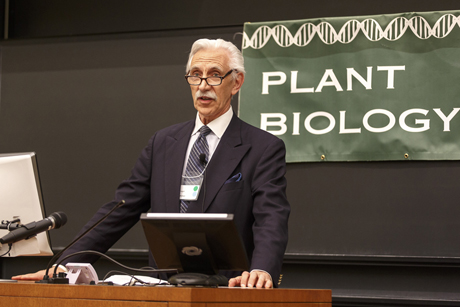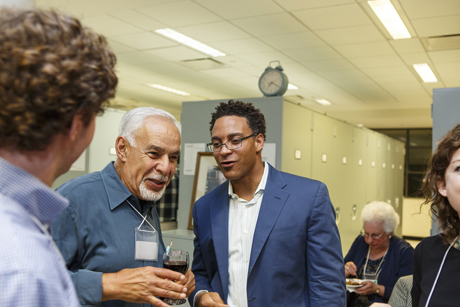100 years of plant biology is celebrated
By Rebecca Harrison


Historically, most important medicines have been derived from plants, said Dr. Marcus McFerren, B.S. ’95, Ph.D. ’00, M.D. ’06, keynote speaker of the Plant Biology Centennial Celebration in the Plant Science Building June 28-29, as he emphasized the continuing relevance of plants in modern medicine.
“Plants continue to be sources of single active principles in FDA-approved pharmaceutical drugs,” added McFerren, a practicing dermatologist who also serves as a consultant on dermatology and plant biochemistry to industry, in his June 28 talk, “A Journey Through Plant Biology: Botanical Medicine and All Its Warts.”
For example, the chemical structure of the numbing agent found in the barbasco plant (the topic of McFerren’s doctoral thesis) is similar to lidocaine, a local anesthetic used in modern medicine. Fishermen in the Amazon use the plant to stupefy fish to make them easy to catch, and it is also used to treat toothaches.
“I posit that plant chemicals continue to be useful tools in treatment of disease, and I point you to this new category: FDA approved ‘Botanical Drugs,’” McFerren said. Serious challenges face this new type of medicine, he said, including issues of efficacy, standardization, intellectual property, sustainability and safety. “These are the challenges. These are the warts in botanical medicine.”
“With a focus on plants and health, a whole new group of undergraduates and graduate students could be trained right here [at Cornell] to attack these challenges and really make a big difference in how plants can be better used,” he said.
The two-day celebration of the 100th anniversary of the Department of Plant Biology also featured lectures on the early history of botany instruction at Cornell which dates back to 1868; on the years of Nobel Laureate Barbara McClintock’s work in the department; on a discussion on plant biology’s role into the next century and a brief look at the state of the art research in the department today – which includes plant proteomics, the biophysics of photosynthesis and phloem transport, cell signaling and development, molecular genetics development and paleobotany, said William Crepet, chair of the department. In addition, graduate students in the field of plant biology gave tours of Cornell’s facilities to the more than 100 guests and alumni attending the celebration.
Rebecca Harrison ’14 is a writer intern for the Cornell Chronicle.
Media Contact
Get Cornell news delivered right to your inbox.
Subscribe